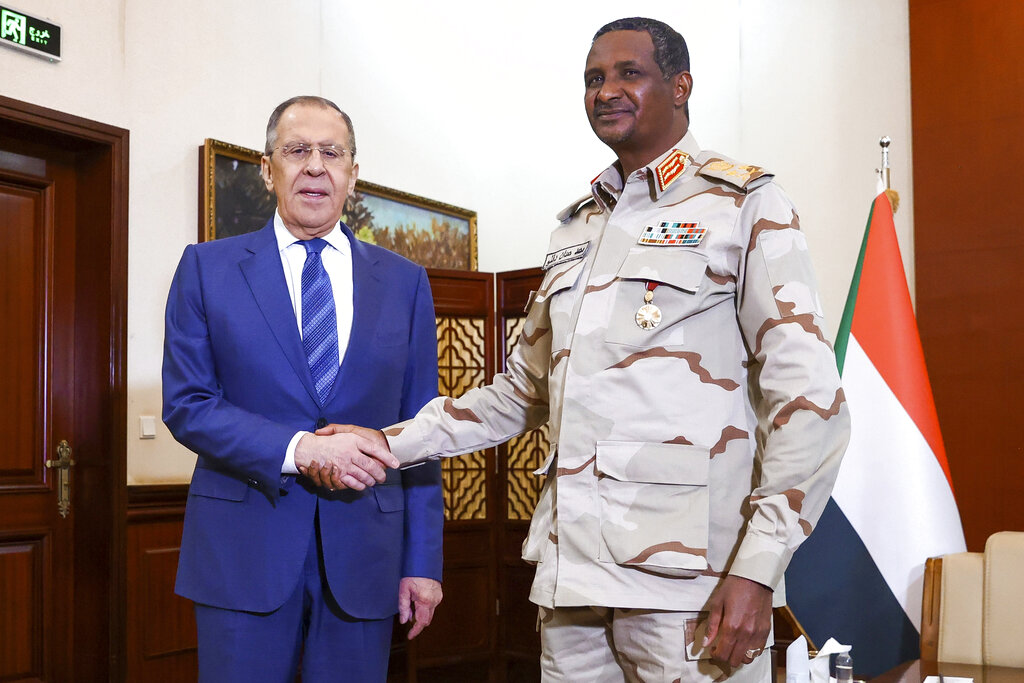ADF STAFF
While Sudan’s rival generals fight to become the country’s chief military power, Russia and its proxy, the Wagner Group, have courted both sides of the conflict to remain in the good graces of whoever comes out on top.
The power struggle is rooted in Sudan’s domestic politics, notes analyst Catrina Doxsee with the Center for Strategic and International Studies. “Even so,” Doxsee wrote recently, “it creates opportunities for foreign actors — including Russia, through Wagner — to intervene to shape a political future conducive to their own interests.”
Russian Foreign Minister Sergei Lavrov demonstrated Russia’s plan to straddle the conflict during his visit to Sudan in February. At that time, Lavrov called on Sudan Armed Forces (SAF) chief Gen. Abdel Fattah al-Burhan, the country’s de facto leader after the 2021 coup. But Lavrov also called on al-Burhan’s deputy and long-time rival, Gen. Mohamed Hamdan Dagalo, also known as Hemedti, who leads the Rapid Support Forces (RSF) militia based in Darfur.
The Russians have two primary interests in Sudan: maintaining the flow of gold from the country’s mines to underwrite its invasion of Ukraine and developing a naval base at Port Sudan, which would give Russia a presence on the Red Sea, a key chokepoint for global trade.
“The outcome of the ongoing power struggle in Sudan will impact the future of both of these key interests, and as a result, Wagner will likely try to shape the outcome in its own favor,” Doxsee wrote.
Wagner has pursued the first goal on the Kremlin’s behalf since it entered the country in 2017, building ties with Hemedti and his family in the process. Between February 2022 and February 2023, Wagner and its affiliates, Meroe Gold and M Invest, smuggled an estimated $1.9 billion in gold out of the country, an amount nearly equal to Sudan’s legitimate mining operations in 2022.
That smuggled gold passes through several Middle East countries before landing in Russia’s war chest.
The naval base discussion began under deposed dictator Omar al-Bashir, who signed a secret deal in 2019 allowing Russian ships to dock in Sudan. Talks stalled under the post-Bashir Sovereignty Council but picked up again after the 2021 coup. In February 2023, Sudan’s military leaders confirmed a 25-year agreement to let Russia build a base at Port Sudan that could support four nuclear-powered vessels. There’s one hitch: The deal must be approved by an as-yet unformed civilian government.
It’s unclear when Sudan might have a civilian government to act on the agreement — either to approve it or to deny it. The transition to a civilian government was first disrupted by the October 2021 coup and then by the outbreak of fighting between the SAF and RSF in April.
Despite Russia’s attempt to balance al-Burhan and Hemedti, recent evidence suggests a preference to tip the scales toward Hemedti, who spent eight days in Moscow in early 2022.
A report by CNN and All Eyes on Wagner found that the mercenary group worked with Libyan Gen. Khalifa Haftar to provide Hemedti’s forces with surface-to-air missiles, tank busters, and other weapons that would help counter the SAF — all materiel that could escalate the fighting between the two sides, according to experts.
Jacqueline Burns, a senior policy analyst with RAND Corporation, a global policy research group, told Voice of America that Wagner’s support for Hemedti and the RSF shows that Russia is seeking to protect its own interests, particularly the gold smuggling that funds its assault on Ukraine.
“The Wagner Group is siding with the party they think is most likely to be able to continue to secure these interests, particularly in opposition to any civilian-led government,” Burns said.

